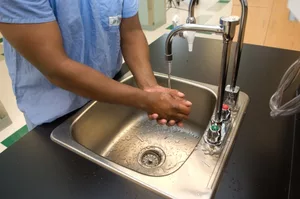In a recent study, it has been found that hospital sinks pose the highest risk for the spread of multidrug-resistant bacteria, with a particular focus on a superbug outbreak at Toho University Omori Medical Center in Tokyo in 2017. The study, published in the American Journal of Infection Control, revealed alarming details about the transmission of the deadly superbug within the hospital.
The outbreak began with the detection of the first case of the superbug in a one-year-old boy in June 2016, followed by a second case in a 15-year-old boy in March 2017. Eventually, the outbreak spread to a total of 19 pediatric patients, raising concerns about the effectiveness of infection control measures in the hospital.
Genomic analysis identified bacterial strains such as Klebsiella variicola, Klebsiella quasipneumoniae, and Escherichia coli in the contaminated sinks, indicating a potential for transmission between different bacterial species within the hospital. Despite replacing and disinfecting the sinks in the pediatric ward, the contamination persisted, highlighting the challenges in controlling the spread of multidrug-resistant bacteria in healthcare settings.
To prevent further outbreaks, the study recommended measures such as hand disinfection after using sinks, using disposable tools for sink cleaning, and avoiding mouth-washing with sink water. These interventions, along with intensive infection control protocols, eventually led to the successful containment of the superbug outbreak in October 2017.
Associate Professor Sadako Yoshizawa emphasized the importance of focusing on water-related areas like sinks in hospital wards to prevent the transmission of multidrug-resistant bacteria and combat antibiotic resistance. The study serves as a critical reminder of the ongoing challenges posed by superbugs in healthcare settings and the importance of implementing effective infection control measures to protect patients and healthcare workers.

 Community Health Initiatives: How Local Engagement Improves Overall Well-being
Community Health Initiatives: How Local Engagement Improves Overall Well-being Unlocking the Benefits of Medicare Part D Plans for 2025
Unlocking the Benefits of Medicare Part D Plans for 2025 Comparing Ascoril D Plus with other cough syrups and expectorants on the market
Comparing Ascoril D Plus with other cough syrups and expectorants on the market AstraZeneca’s Covishield To Cause Rare Yet Serious Side Effects
AstraZeneca’s Covishield To Cause Rare Yet Serious Side Effects Reinforce Your Smile: Discover the Benefits of Hydroxyapatite Toothpaste
Reinforce Your Smile: Discover the Benefits of Hydroxyapatite Toothpaste Shilajit for Women: Balancing Hormones and Supporting Wellbeing
Shilajit for Women: Balancing Hormones and Supporting Wellbeing Learn All About Truck Accident And What a Truck Accident Lawyer Can Help
Learn All About Truck Accident And What a Truck Accident Lawyer Can Help Fever: Symptoms, Treatments, Types, and Causes
Fever: Symptoms, Treatments, Types, and Causes